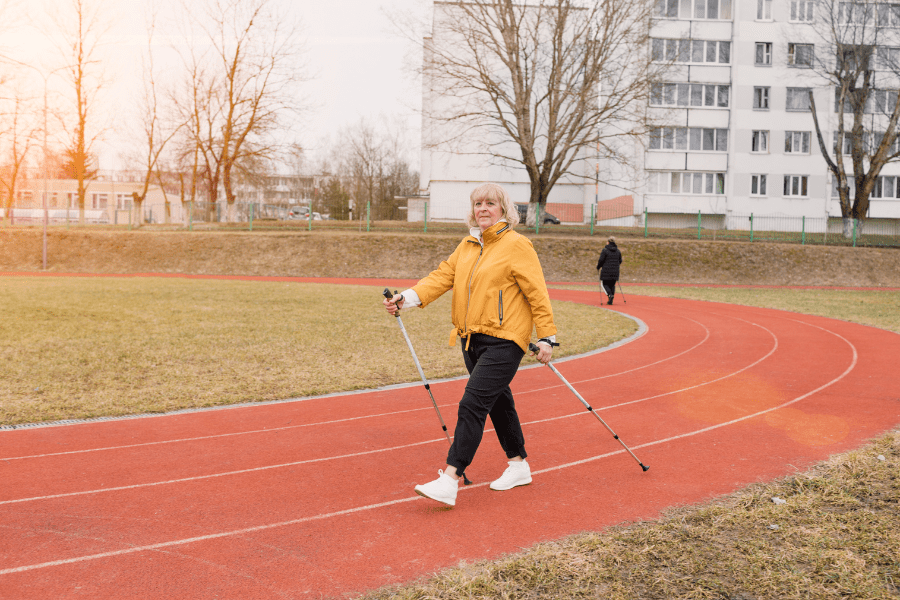Have you found that almost every time you go for a checkup, the doctor suggests that you walk more? Or at the very least the doctor asks about your physical exercise and walking habits? Walking is a simple task that you’ve been doing since you were just a baby. Yet the health benefits of a regular walking routine are irreplaceable. No medicine can makeup for a lack of walking so make it your goal to walk everyday.
This article offers some of the surprising health benefits that a simple walk each day can provide. Dig in and see which suggestions you can put into practice. But first let’s begin with a question:
Question: How far do you think you will walk in your lifetime?
Answer: 115,000 – Yes that’s right, 115,000 miles!
That’s halfway to the moon or the equivalent mileage on my wife’s 10-year-old VW Beetle. Poor thing she needs a bit of TLC, as does the Beetle!
Whilst the Falls Awareness Week continues, an important article was published this week that highlighted the importance of taking regular 15 minute walks every day – and especially after having a meal. Why?
Walking reduces your risk of developing type-2 diabetes and other conditions.
So whilst we are being encouraged to go for that 15-minute stroll, what’s the worst thing to do after a meal? Well, it’s the thing most of us probably feel like doing, in fact, it’s what I did last night – and that’s crash out on the sofa and reach for the TV remote control! Apparently, that’s very bad!
It’s all about reducing our blood sugar level, which can be higher post meal. This is especially true in people in their 70’s and 80’s because their muscles have a higher resistance to insulin and lower secretion of insulin from the pancreas. This high blood sugar is an important factor in the progression of glucose tolerance to type 2 diabetes and cardiovascular disease.
Physical benefits of walking
Walking each day doesn’t mean you have to cover a marathon’s distance. Even just 15 minutes walking each day can result in tremendous physical benefits.
For example, daily walking can help you:
- Lose unwanted body fat
- Maintain a health weight
- Improve cardiovascular fitness
- Prevent or manage various conditions, including heart disease, stroke, high blood pressure, cancer and type 2 diabetes
- Strengthen your bones and muscles
- Increase energy levels
- Improve your balance and stamina
- Strengthen your immune system
Mental Benefits of Walking
The health benefits of walking are not just limited to physical health. Walking regularly can have a great affect on your mental health as well. From positive moods to better sleep, a walk each day is definitely worth while.
Walking can also help you:
- Improve your mood
- Improve your memory
- Have a positive outlook and feeling of accomplishment
- Reduce stress and tension
- Get better sleep
Make walking part of your routine
Have you heard the saying? “Start little. Start now.” Yes, getting into a habit of walking can take some hard work and discipline to begin. Why not start today? Even if you can only walk a few minutes before tiring out. Try to get better each day until it becomes happy and you begin to enjoy the benefits.
So the recommendation is to try and take a 15 minute stroll after letting your food go down for each meal you have. In fact, researchers say that a 15 minute walk is actually better for you than one full 45 minute walk. The most important walk of the day is said to be after our evening meal! Then you can crash on the sofa!
Wimbledon is soon to be upon us, and the former Women’s Champion Martina Navratilova is a real advocate of walking. She said purchasing a pedometer was a great motivation to get out and walk as she could check her progress.
She highlights a study that showed a group of 60-70 year olds being put on a 12 month gentle exercise plan. All of them lost weight, most importantly around the abdominal area.
Martina gives a few tips on walking too. She advises:
- Wear athletic shoes
- Keep your head level looking straight ahead
- Bend your elbows at 90 degrees and keep them close to your sides.
- Swing your arms back and forth as you walk.
- Let your heel strike the ground first
- Take long smooth strides
- Breathe deeply but naturally
For some, performing the above tips may be a bit daunting. So it may mean motivating ourselves to have a gentle stroll around the garden. What we would say is not to forget to take your personal alarm pendant with you. Most pendants have a range of around 100 metres, so if you do plan to go for a walk in your garden you know we are there if you need us!
If you enjoyed reading this article, check out our blog for similar information.





